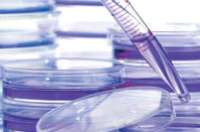Potential brain tumour drug can distinguish cancer cells from healthy ones

A potential new drug, already in clinical development, can stop brain tumour cells growing while leaving healthy cells alone, according to new research published today (Wednesday) in PLOS ONE.
Cancer Research UK scientists from the Samantha Dickson Brain Cancer Unit, which is funded by The Brian Tumour Charity, at the UCL Cancer Institute in London focused on glioblastoma, the most common type of brain tumour. Using cells growing in the lab, they treated glioblastoma cells and healthy cells with more than 150 potential drugs, and compared the responses. One of these molecules, called J101, was able to stop the cancer cells growing but left the normal cells alone.
J101 blocks a cellular 'messaging' molecule called polo-like kinase 1 (Plk1), which tells cancer cells to multiply. The researchers looked for similar drugs and found three already in clinical development that stop the growth of cancer cells in the same way. Importantly, these other agents are also better able to cross from the bloodstream into the brain than J101, which doesn't pass easily into the brain.
The hardest task for any cancer drug is distinguishing between cancerous cells and normal tissue, as collateral damage to healthy cells leads to side effects. Further tests in mice showed that one of the reasons this new molecule is able to tell the difference between healthy brain cells and cancer cells may be due to a faulty p53 gene. Known as the "guardian of the genome", p53 protects and repairs DNA damage that could lead to cancer. Mistakes in p53 are the most common gene faults found in glioblastoma tumours.
Dr Steve Pollard, senior research fellow at University College London Cancer Institute and lead author on the study, said: "The pharmaceutical industry has developed many different compounds which are now in preclinical and clinical development as anti-cancer drugs. The challenge is determining which potential therapies should be prioritised for which cancers. In this study we show that these glioblastoma cells are particularly vulnerable to these new treatments probably because of faulty p53, and we want to see them developed to treat the disease."
Dr Kat Arney, Cancer Research UK's science communications manager, said: "We urgently need to find more effective ways to treat brain tumours, so this study is a great example of lab-based research that is immediately relevant to patients. The fact that these molecules are already under clinical development should hopefully speed up the process of getting these drugs into clinical trials, so patients can benefit as soon as possible."
More information: Danovi, D, et al, A high-content small molecule screen identifies sensitivity of glioblastoma stem cells to inhibition of polo-like kinase 1 (2013) PLOS one. DOI: 10.1371/journal.pone.0077053



















